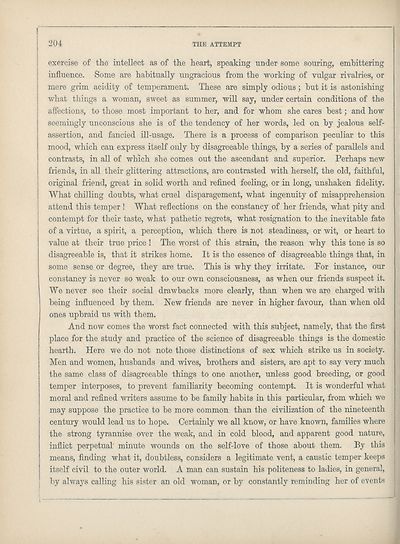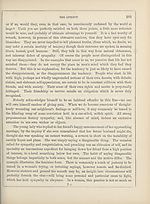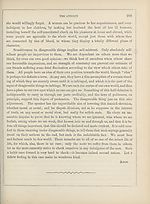Attempt > Volume 1 and Select writings
(216) Page 204
Download files
Complete book:
Individual page:
Thumbnail gallery: Grid view | List view

204
THE ATTEMPT
exercise of the intellect as of the heart, speaking under some souring, embittering
influence. Some are habitually ungracious from the working of vulgar rivalries, or
mere grim acidity of temperament. These are simply odious; but it is astonishing
what things a woman, sweet as summer, will say, under certain conditions of the
aflections, to those most important to her, and for whom she cares best; and how
seemingly unconscious she is of the tendency of her words, led on by jealous self-
assertion, and fancied ill-usage. There is a process of comparison peculiar to this
mood, which can express itself only by disagreeable things, by a series of parallels and
contrasts, in all of which she comes out the ascendant and superior. Perhaps new
friends, in all their glittering attractions, are contrasted with herself, the old, faithful,
original friend, great in solid worth and refined feeling, or in long, unshaken fidelity.
What chilling doubts, what cruel disparagement, what ingenuity of misapprehension
attend this temper ! What reflections on the constancy of her friends, what pity and
contempt for their taste, what pathetic regrets, what resignation to the inevitable fate
of a virtue, a spirit, a perception, which there is not steadiness, or wit, or heart to
value at their true price ! The worst of this strain, the reason why this tone is so
disagreeable is, that it strikes home. It is the essence of disagreeable things that, in
some sense or degree, they are true. This is why they irritate. For instance, our
constancy is never so weak to our own consciousness, as when our friends suspect it.
We never see their social drawbacks more clearly, than when we are charged with
being influenced by them. New friends are never in higher favour, than when old
ones upbraid us with them.
And now comes the worst fact connected with this subject, namely, that the first
place for the study and practice of the science of disagreeable things is the domestic
hearth. Here we do not note those distinctions of sex which strike us in society.
Men and women, husbands and wives, brothers and sisters, are apt to say very much
the same class of disagreeable things to one another, unless good breeding, or good
temper interposes, to prevent familiarity becoming contempt. It is wonderful what
moral and refined writers assume to be family habits in this particular, from which we
may suppose the practice to be more common than the civilization of the nineteenth
century would lead us to hope. Certainly we all know, or have known, families where
the strong tyrannise over the weak, and in cold blood, and apparent good nature,
inflict perpetual minute wounds on the self-love of those about them. By this
means, finding what it, doubtless, considers a legitimate vent, a caustic temper keeps
itself civil to the outer world. A man can sustain his politeness to ladies, in general,
by always calling his sister an old woman, or by constantly reminding her of events
THE ATTEMPT
exercise of the intellect as of the heart, speaking under some souring, embittering
influence. Some are habitually ungracious from the working of vulgar rivalries, or
mere grim acidity of temperament. These are simply odious; but it is astonishing
what things a woman, sweet as summer, will say, under certain conditions of the
aflections, to those most important to her, and for whom she cares best; and how
seemingly unconscious she is of the tendency of her words, led on by jealous self-
assertion, and fancied ill-usage. There is a process of comparison peculiar to this
mood, which can express itself only by disagreeable things, by a series of parallels and
contrasts, in all of which she comes out the ascendant and superior. Perhaps new
friends, in all their glittering attractions, are contrasted with herself, the old, faithful,
original friend, great in solid worth and refined feeling, or in long, unshaken fidelity.
What chilling doubts, what cruel disparagement, what ingenuity of misapprehension
attend this temper ! What reflections on the constancy of her friends, what pity and
contempt for their taste, what pathetic regrets, what resignation to the inevitable fate
of a virtue, a spirit, a perception, which there is not steadiness, or wit, or heart to
value at their true price ! The worst of this strain, the reason why this tone is so
disagreeable is, that it strikes home. It is the essence of disagreeable things that, in
some sense or degree, they are true. This is why they irritate. For instance, our
constancy is never so weak to our own consciousness, as when our friends suspect it.
We never see their social drawbacks more clearly, than when we are charged with
being influenced by them. New friends are never in higher favour, than when old
ones upbraid us with them.
And now comes the worst fact connected with this subject, namely, that the first
place for the study and practice of the science of disagreeable things is the domestic
hearth. Here we do not note those distinctions of sex which strike us in society.
Men and women, husbands and wives, brothers and sisters, are apt to say very much
the same class of disagreeable things to one another, unless good breeding, or good
temper interposes, to prevent familiarity becoming contempt. It is wonderful what
moral and refined writers assume to be family habits in this particular, from which we
may suppose the practice to be more common than the civilization of the nineteenth
century would lead us to hope. Certainly we all know, or have known, families where
the strong tyrannise over the weak, and in cold blood, and apparent good nature,
inflict perpetual minute wounds on the self-love of those about them. By this
means, finding what it, doubtless, considers a legitimate vent, a caustic temper keeps
itself civil to the outer world. A man can sustain his politeness to ladies, in general,
by always calling his sister an old woman, or by constantly reminding her of events
Set display mode to: Large image | Transcription
Images and transcriptions on this page, including medium image downloads, may be used under the Creative Commons Attribution 4.0 International Licence unless otherwise stated. ![]()
| Ladies' Edinburgh Debating Society publications > Attempt > Volume 1 and Select writings > (216) Page 204 |
|---|
| Permanent URL | https://digital.nls.uk/109867546 |
|---|
| Attribution and copyright: |
|
|---|

